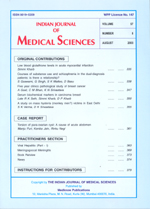
|
Indian Journal of Medical Sciences
Medknow Publications on behalf of Indian Journal of Medical Sciences Trust
ISSN: 0019-5359
EISSN: 0019-5359
Vol. 63, No. 6, 2009, pp. 235-243
|
 Bioline Code: ms09043
Bioline Code: ms09043
Full paper language: English
Document type: Research Article
Document available free of charge
|
|
|
Indian Journal of Medical Sciences, Vol. 63, No. 6, 2009, pp. 235-243
| en |
Objective standardized clinical assessment with feedback: Adapting the objective structured clinical examination for postgraduate psychiatry training in India
Chandra, Prabha S; Chaturvedi, Santosh K & Desai, Geetha
Abstract
Background: The objective structured clinical examination (OSCE) is used commonly for assessment of psychiatry trainees but has been used less for teaching.
Aim and Setting: This study describes the adaptation of the OSCE method for training purposes in a postgraduate psychiatry training center in India and the initial findings with regard to trainee performance.
Materials and Methods : The adapted method was called the objective structured clinical assessment with feedback (OSCAF). The adaptation included several steps - modifying existing OSCE patterns for language and cultural appropriateness, using supervised roleplaying instead of standardized or simulated patients and evolving an assessment method (14-item checklist) that would generate feedback. This exercise was conducted in front of a group of multidisciplinary peers and supervisors.
Statistical Analysis: Descriptive statistics and ANOVA were used. Results: Analysis of the performance based on the 14-item checklist assessing common elements of any patient-related interaction in 34 different OSCAF tasks indicated the following: less-than-satisfactory (< 75%) performances in the following areas - assuring confidentiality (73.5%), assessing comfort (62%), summarizing (60%), closure (62%) and checking whether the ′patient′ had understood what was being communicated (42%). Based on the nature of clinical situations, performances on some specific and difficult OSCAF situations were found to be inadequate and indicated need for further training.
Conclusions: We have been able to demonstrate OSCAF to be a convenient, cost-effective training method in psychiatry, with limited demands on resources; however, further refinements in ratings and feedback methods and studies on effectiveness may enhance its utility.
Keywords
Medical education, objective structured clinical examination, postgraduate psychiatry, training
|
| |
© Copyright 2009 Indian Journal of Medical Sciences.
Alternative site location: http://www.indianjmedsci.org/
|
|
